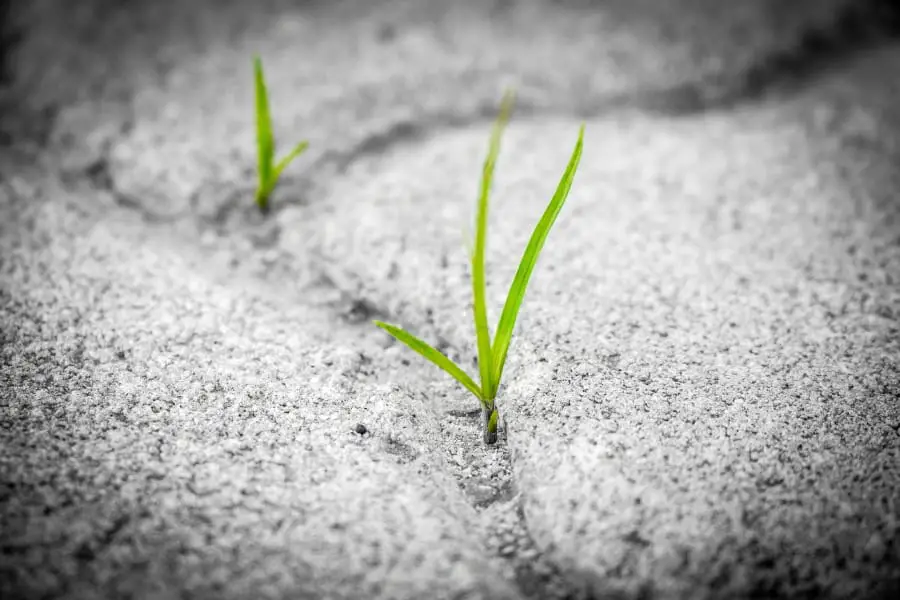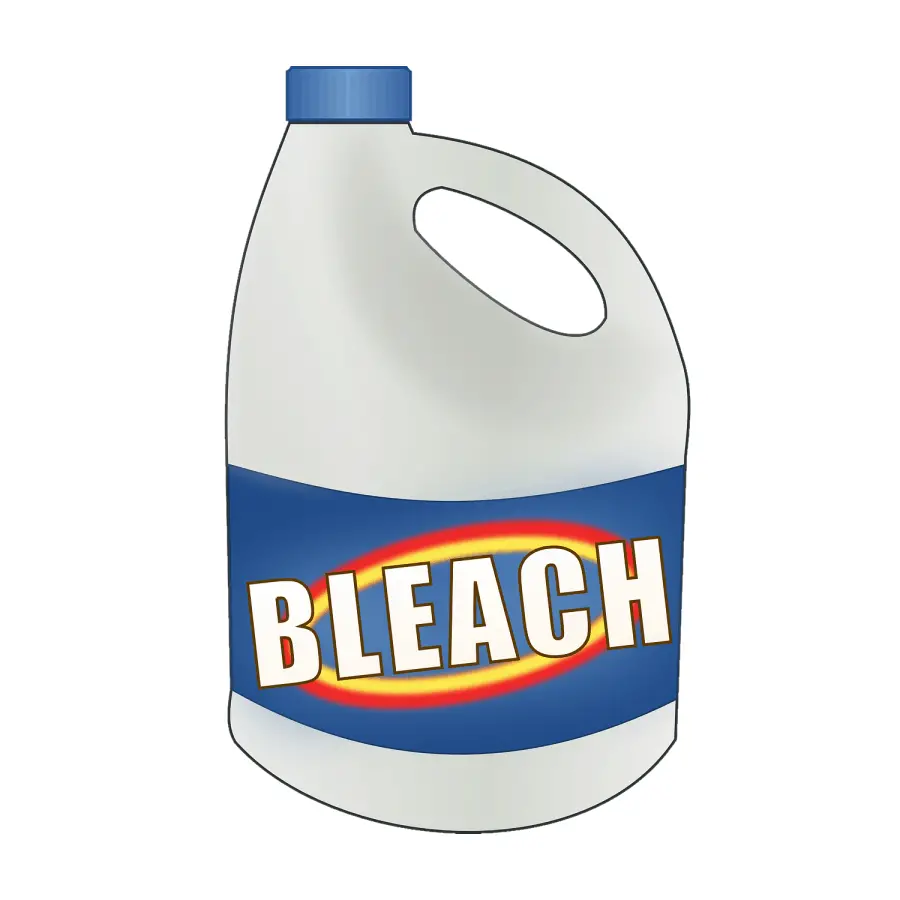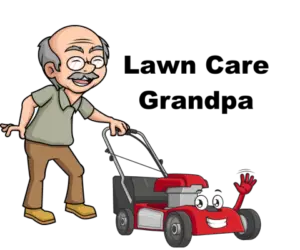There are several ways to rid your yard of grass and any pesky weeds. Physical methods are often derided for taking too long and being, in some cases, largely ineffective. This has led to many homeowners and farmers opting for a chemical solution.
Chlorine bleach is an effective liquid grass and small weed killer for driveways, sidewalks, and even lawns. It can even be diluted in a 2:1 ratio with water. The effectiveness of each covering is dependent on conditions like weather, soil condition, and chlorine concentration.
This article will examine the effectiveness of bleach as a grass and weed killer. I will break down the chemical impact this everyday solution has on soils, as well as the speed of those reactions. We also will discuss the long-term effects of exposing grass to bleach.

Contents
Will All Types Of Bleach Kill Grass?
Perhaps you’re trying to clear a bit of your lawn to make room for a new swimming pool or an outbuilding like a shed. Maybe you want to lay down some artificial grass in order to trim your water bill. Maybe you just woke up hating your grass for no reason!
We have known customers that have wanted everything from small patches of invading grass types killed off in their lawns to those wanting the grass completely done away with in their yards. There are many different terrains, soil types, and landscaping plans from home to home, business to business.
Whatever your motivation, we’re here to tell you that you (probably) have a solution in your home already… bleach!
Not All Bleaches Are Created Equal
Yes, most regular surface cleaning/stain removing bleach is a locked and loaded weapon of grass destruction.
If your motives for getting rid of your grass are largely economic, you will be pleased to learn that bleach will also save you from purchasing gallons of potentially expensive herbicide. There are certainly other solutions for killing grass and weeds that you can buy, but bleach will be the most cost effective in nearly every scenario.
We all know that grass is tough, and it requires even tougher chemical cocktails to kill it for good. So, what exactly is in bleach? And why does it hurt grass so much?
Sodium Hypochlorite
Most household bleaches, specifically, are controlled versions of a chemical known as sodium hypochlorite. “Chlorite” basically means that chlorine is part of the compound. “Hypochlorite” is chemical jargon that (in simple terms) indicates that the solution releases chlorine as, and when, needed.
According to the Western University of Canada, everyday household bleach contains between 5% and 6% sodium hypochlorite. This amount of chlorite makes the liquid fairly concentrated for most household uses.
You can check the prices on larger residential supplies of bleach here on Amazon.
Sodium Percarbonate
We also have oxygenated bleaches. Sodium percarbonate is a popular example. However, we won’t worry too much about this kind of bleach as it is not harmful to plants and it won’t do any harm to your grass.
But chlorine bleach will.
Though oxygenated bleach is good for disinfecting surfaces and for use on colored or delicate fabrics, it doesn’t have the strength to kill grass. It is definitely safer for skin exposure and less ‘toxic’ in cleaning situations which makes it a good choice for indoor uses.
Other articles from the grandpas that you may enjoy…
- How To Get Rid of Milkweed – 12 Ways Experts Do It
- What Are Lawn Mower Blades Made Of?
- How Fast Does A Lawnmower Blade Spin?
Chlorine Bleach Is The Secret To A Grass Free Area
The fact is chlorine bleach doesn’t only affect the grass directly. It also affects the soil that holds the grass. Healthy fertile soil, as you know, is home to several species of microorganisms, bacteria, and animals that are directly responsible for the production of micronutrients useful for plant life.
Alkalinity Or Acidity
For these organisms to survive and thrive, the soil must have consistent conditions. One of these conditions is pH, which is the soil’s level of alkalinity or acidity. Because of bleach’s high pH (usually around 11-12), it can increase soil alkalinity to levels that are fatal for these organisms.
Not only does a high pH lead to fewer soil nutrients, but it also affects how the grass absorbs them. Elements like magnesium are essential for healthy plant growth, but a high pH will hinder absorption.
Chlorine And pH
Now, while chlorine is not an unusual part of healthy soil, the concentrations found in hypochlorite bleaches are way too high. If bleach is poured into healthy soil, a series of chemical reactions will result in the formation of chloride compounds (salts) that are taken up by plants (or grass) and wreak havoc.
These salts eventually impact the grass’s ability to absorb water and nutrients, which causes it to turn brown before it wilts and dies. The grass is effectively dehydrated. This is known as chlorine toxicity.
How Much Bleach Does It Take To Kill Grass?

Chlorine bleach’s effect on grass is so strong that you don’t necessarily have to pour it straight from the container. Even bleach that has been diluted further can achieve the same results.
Bleach will kill dry grass with a liberal coating mixed with water. Mix a 2:1 ratio of bleach to water in a 1 to 4 gallon garden sprayer of your choice if you want to hit a sizeable portion of your yard. Smaller bottles of 1 to 4 quarts can be used for walkways and smaller areas.
Take safety precautions by wearing gloves and goggles. You don’t want a bleachy mist finding its way into your eyes!
To contrast the concentration levels we are speaking of, the Western University of Canada recommends a 1:10 ratio of bleach to water dilution for most household cleaning and disinfecting applications. Here we are working with five times the strength.
You also want to spray on a calm, rain-free day to maximize the bleach’s chances of infiltrating the soil. Rainwater will wash the bleach away before it can get to work.
The mist must be sprayed generously to ensure the grass dies.
How Fast Does Bleach Kill Grass?
The speed with which bleach kills grass depends on several factors. The type of grass, soil, and even weather have parts to play in the process.
Chlorine bleach with the proper conditions will effectively kill grass and many types of weeds in 2-4 days. The factors that can speed up the process include soil conditions, the types of grass and plants it is applied to, and the amount of chlorine concentration in the solution.
Concentration Of Bleach Can Speed Up Clearing Grass
The first is the concentration of the bleach solution. This is pretty straightforward: the greater the concentration of bleach, the faster it will work.
Most plants actually use chlorine as a micro-nutrient and adverse effects can occur in its complete absence. It is the excessive amounts of chlorine in some bleach that kills off unwanted plants.
In a study done by researchers from the University of California, Berkeley, chlorine was found to be an important factor for healthy growth of even many common garden plants and their vegetables we eat every day.
Some vegetables yields are measurably increased with proper limited amounts of bleach:
- Lettuce
- Tomatoes
- Cabbage
- Carrots
- Sugar beets
- Barley
- Alfalfa
- Buckwheat
- Corn
- Beans
Soil Conditions Affect Bleach Effectiveness
The second factor is the pre-existing soil conditions. Bleach will require a bit more time to negatively affect rich soils, which will still be able to supply the grass with nutrients. On the other hand, grass on poor soil will likely be on its last legs anyway, which allows the bleach to kill it faster.
Some Grasses Are Killed By Bleach Faster Than Others
The type of grass may also influence the time it takes to kill it. Grasses that constantly need to reabsorb nutrients and water are likely to absorb the bleach and chloride salts faster than those that don’t.
All in all, depending on these and any other factors, bleach should kill your grass in 2-3 days.
Will Grass Grow Back After Bleach Treatment?
Remember how I said bleach affects the soil and not just the grass? Well, this means the effects of bleach can go much further than the death of your current crop of grass. So, will grass grow back in areas treated with bleach?
Grass will grow back in locations treated with chlorinated bleach over time. Time frames for grass coverage will be longer than in areas that have not been exposed. This is due to the effect that chlorine has on the soil. It could take an entire growing season for ground levels to return to normal.
This leads to our next question. If a healthy soil ready to grow new plants is the goal in the future, is it a good idea to use bleach then to kill off presently unwanted grass?
Will Bleach Kill Grass Permanently?
If soil is exposed to excessive levels of bleach, it may retain a very high pH for a long time. It is not uncommon for bleached soils to retain a high pH for an entire season!
As we’ve already seen, soil that is too alkaline is not conducive for nutrient-generating organisms. A lack of nutrients means that very little can grow in the affected soil.
Grass And Weeds Can Grow Back After Bleach… Eventually.
That said, however, grass can grow back in time. It’s just a matter of allowing the soil to rebalance itself while the bleach is diluted away. Even soils that are unusable for the season will be able to support grass again eventually.
When the pH levels drop towards normalcy, microbes and other organisms will return and reproduce, which will result in the production of plant-sustaining nutrients. Regular pH tests must be conducted to monitor if the soil is ready to support life again.
With time, you will be able to re-plant a new generation of grass.
Final Touches On Bleach Killing Grass…
Grass can be started again or completely eliminated in most any area with the right type and concentration of bleach. Though it may not seem so at first glance, chlorine is natural and even found in most soils in small quantities.
As with most things, excessive amounts of bleach make it destructive. This is how grass and weeds can be killed and removed using the chlorine version of the solution.
The cost as well as effectiveness makes it a great choice for homeowners. Just be sure to wear proper eyewear and protective clothing, and especially articles you don’t mind getting BLEACHED!
There are many other articles that you may also find interesting on our site…
- How To Get Rid of Milkweed – 12 Ways Experts Do It
- What Are Lawn Mower Blades Made Of?
- How Fast Does A Lawnmower Blade Spin?
References
https://www.hunker.com/12231831/how-does-clorox-bleach-affect-plants
